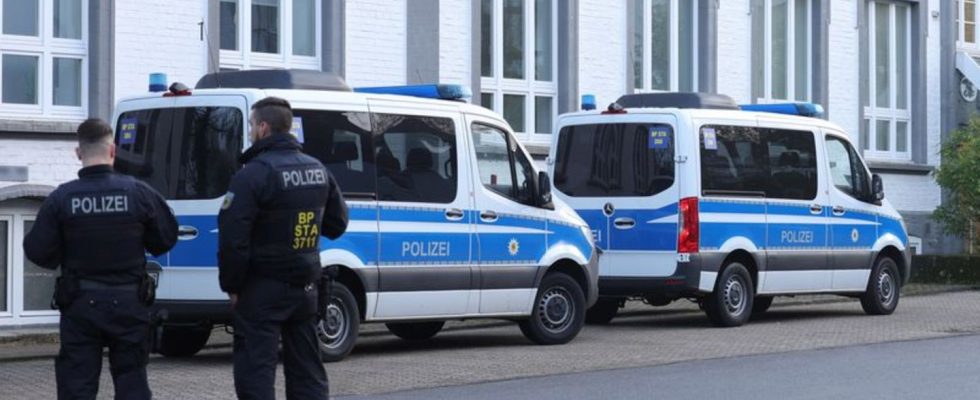A gang is said to have sold residence permits on a large scale, especially to Chinese people, for a lot of money. Now the federal police have struck – also with banknote sniffing dogs.
In a large-scale raid against an international smuggling gang in eight federal states, the Düsseldorf public prosecutor’s office arrested ten suspects. 38 suspected gang members and 147 people who are said to have been trafficked are being targeted, as the Federal Police Directorate in Sankt Augustin announced. If you include family members who were brought later, there are around 350 mostly Chinese nationals, said Düsseldorf public prosecutor Julius Sterzel to the German Press Agency.
During the large-scale operation, more than 1,000 officers from the federal police and the public prosecutor’s office searched a total of 101 residential and business premises in North Rhine-Westphalia, Schleswig-Holstein, Hamburg, Berlin, Hesse as well as Rhineland-Palatinate, Baden-Württemberg and Bavaria. The Düsseldorf public prosecutor’s investigations have been ongoing since 2020, said Sterzel.
Also suspected of bribery and money laundering
The main suspects are two 42 and 46 year old lawyers from the Cologne area. In addition to the accusation of smuggling, the public prosecutor’s office is also investigating suspicions of bribery and money laundering.
The lawyers are said to have recruited rich foreigners through their law firms, mostly from China and the Arab world. “With the prospect of a permanent residence permit, the trafficked people are said to have paid amounts between 30,000 and 350,000 euros to the law firms,” reported the police. Compared to most of the people transported by smugglers, this was a wealthy clientele, confirmed Sterzel.
The main suspects are suspected of using the funds to set up fake companies, finance alleged residences and fake wage payments, among other things. “In addition, not inconsiderable amounts are said to have served to enrich the accused.”
According to the investigators, the residence permits were obtained from the North Rhine-Westphalian immigration offices in the cities of Kerpen and Solingen as well as the districts of Rhein-Erft and Düren. The ten arrested also include an employee of the Düren district who is said to have played a key role in the smuggling and received bribes for it.
Federal Interior Minister Nancy Faeser (SPD) said of the raids: “Now it is important to examine all the backgrounds and put a stop to these organized crime structures.” In the fight against smuggling gangs, “this high level of investigative pressure and this consistent crackdown” are needed.
Almost 300 bank accounts blocked
“So far, extensive evidence and significant assets have been secured, including around 210,000 euros in cash,” the statement says. “A total of 269 bank accounts were also blocked and 31 properties were given a security mortgage.”
According to the Federal Police, search warrants were executed in a number of municipalities during the large-scale operation. In North Rhine-Westphalia these were Aachen, Bergheim, Bergisch-Gladbach, Düren, Düsseldorf, Frechen, Heimbach, Kerpen, Cologne, Kreuzau, Pulheim, Ratingen, Roetgen, Siegburg and Solingen. Searches were also carried out in Berlin, Frankfurt am Main, Freiburg, Hamburg, Hoppstädten-Weiersbach, Hüttlingen, Landau in der Pfalz, Mainz, Munich, Oberursel, Quickborn, Überlingen and Wilhelmsdorf.
According to the police, the search objects included not only the office and living quarters of the main accused, but also the supposed offices of the fake companies and supposed residences – including two castles in the Eifel. The premises of the immigration offices concerned are therefore also the subject of the investigation.
Banknote sniffing dogs are also in use
In addition to several federal police units, banknote-sniffing dogs were also reportedly involved in the large-scale operation. The Düsseldorf public prosecutor’s office wanted to announce further details in the afternoon (2 p.m.) – including the number of arrest warrants executed.
Smuggling refers to helping people enter Germany illegally, usually in exchange for money. This involves driving services, false documents, travel organization or accommodation.
Unauthorized entry and stay are punishable under the Residence Act. Anyone who is in this country without a residence permit must leave the federal territory. There are prison sentences of between one and 15 years for commercial smuggling.
In 2022, the Federal Criminal Police Office and the Federal Police registered 4,936 cases of smuggling across Germany – an increase of almost 30 percent compared to the previous year. The background is the sharp increase in irregular migration to Europe. The current smuggling crime situation report from 2022 states that the perpetrators are acting “very professionally and flexibly” and that there is also an increasing willingness to take risks.

